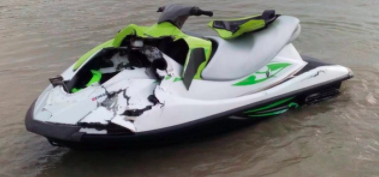A boating accident is actually handled quite differently than an accident on the highway or a typical street or avenue. We here at Schrier Law Group want to go over the best procedure for what one should do if they are ever in a boating accident. As a Florida law firm, we see our share of boating accidents.
1. What Do I Do First After a Boating Accident?
If you have had a boating accident, you must first take care of the health and safety of those involved. Ensure everyone is safely on the boat if it is still afloat, or another safe place if it is not, and the boat is out of harm’s way. Then you should signal for help, if necessary, and seek medical attention for any injuries. A medical report will also be important evidence in any legal action.
You are going to need to gather details at the scene of the accident. Obtain registration numbers and insurance details for those involved, and contact details for the boat operators, passengers, and witnesses. If possible, take photos and video of the scene.
Then you have to report the boating accident to the U.S. Coast Guard and the State Fish & Wildlife Police. An accident report will be evidence for any action and is usually required by law.
Contact your insurance provider and an experienced boating accident attorney like Schrier Law Group. Do not accept liability or discuss the accident with the other parties or insurers before speaking to your lawyer.
2. What is Required of the Operator in a Boating Accident?
An operator involved in a boating accident must stop the vessel at the scene of the accident and offer assistance to anyone injured or in danger unless doing so would seriously endanger their own vessel or passengers. The operator is also required to notify the U.S. Coast Guard and the State Fish & Wildlife Police in accordance with state and federal laws.
3. What Types of Boating Accidents Need to Be Reported?
Federal law requires that a boating accident must be reported to the U.S. Coast Guard and State Fish & Wildlife Natural Resources Police if:
- A person dies
- A person is injured and requires medical treatment beyond first-aid
- A person disappears from the boat under circumstances that indicate death or injury
- Damage to the boat and other property totals more than $2,000 by federal law or there is a complete loss of the vessel
4. How Soon Should the Accident Be Reported?
A boating accident must be reported to the U.S. Coast Guard within 10 days of the accident or death, or within 48 hours if a person:
- Dies within 24 hours
- Is injured requiring medical treatment beyond first aid
- Disappears from the vessel under circumstances that indicate death or injury
5. Does Homeowners Insurance Cover Boating Accidents?
Homeowners’ insurance typically provides minimal coverage for a boating accident. Most policies will cover up to $1,000 damages to a boat, jet skis, or another recreational water vehicle, and generally cover damage by fire, wind or air, explosive hail, and vandalism.
6. How Common are Boating Accident Fatalities?
In 2019, the U.S. Coast Guard counted 4,168 recreational boating accidents in the U.S. that involved 613 deaths and 2,559 injuries. The fatality rate was 5.2 deaths per 100,000 registered recreational vessels. Detailed statistics are available at the U.S. Coast Guard website.
7. What are the Most Common Watercraft in Boating Accidents?
The top three types of watercraft involved in boating accidents in the U.S. according to 2019 statistics compiled by the U.S. Coast Guard, were open motorboats, personal watercraft, and cabin motorboats.
8. What are the Most Common Injuries Suffered in Boating Accidents?
The most common injuries suffered in boating accidents are:
- Drowning
- Traumatic brain injuries
- Spinal cord injuries
- Lacerations and amputations
- Whiplash
- Electrocution
- Concussions
- Burns
- Broken bones
9. What Safety Measures Prevent Wrongful Death and Injuries Caused By a Boating Accident?
- Do not drink and boat – Boating while intoxicated is the leading cause of boating accidents in the U.S.
- Wear a lifejacket – All boat operators and passengers should wear a properly fitting USCG-approved lifejacket. The law requires that they are accessible for all passengers, and worn at all times by children.
- Know the rules – Boating operators should take a boating safety course before getting out on the water, and follow the rules at all times. Inexperienced and inattentive boat operators cause accidents.
- Stay within speed limits – Speeding is a primary contributing factor in boating accidents nationwide.
- Practice boat propeller safety – Boat propellers can cause catastrophic injuries. Operators and passengers should be safe, and a propeller guard should be used if appropriate for the vessel.
- Watch the weather – Always check the weather forecast before getting out on the water. Weather can be unpredictable in all seasons and can create a very dangerous situation for watercraft.
10. What are the Most Common Causes For Boating Accidents?
The top five primary contributing factors in boating accidents in the U.S. in 2019 according to the U.S. Coast Guard were:
- Operator inattention
- Improper lookout
- Operator inexperience
- Excessive speed
- Alcohol use
Much of this information is available at the U.S. Coast Guard website.
The Schrier Law Group handles many boating accident cases, and Schrier Law has the resources necessary to help you and your family score a successful outcome in any boating injury case. It is important that you have your rights defended by someone who knows the law. Contact the Schrier Law Group for a personal injury attorney in Florida today!






